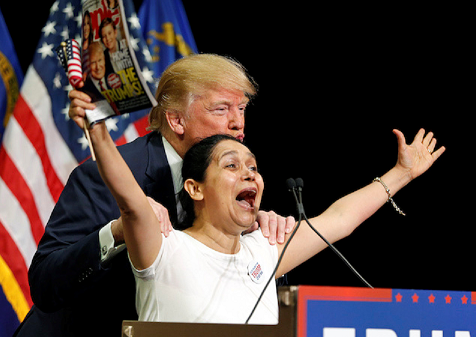After yesterday’s showing of “American Sniper” I came away having seen a film I didn’t expect to see, and possibly even one Clint Eastwood didn’t intend. It was a great film, but having had a week’s head start on the bile and invective foisted upon it by what I can say now, in hindsight, are really slow-witted leftists, the film did much to express cinematically the great divide in America, and it gratified me to know that we (“the people”- as my friend JadedbyPolitics likes to say) still far-outnumber the other side. In fact, I doubt many of “American Sniper’s” detractors actually saw it in a theater, since, probably unable to keep their mouths shut, in an auditorium such as mine, filled to the rafters, they would have carried an ass-kickin’ all the way into the lobby had they popped off during the film. And the husbands would have been angry too.
Remember that college professor near Philadelphia right after 9/11, the one whose son joined the Marines? The one whose son told him that he was just doing what he’d always been raised to do; to choose Good over Evil? The professor was shunned by his colleagues for having been such a poor father, but he backed his kid anyway. Then there was the coffee-klatch Democrat Cindy Sheehan who went the opposite way, when son Casey enlisted, embarrassing her in front of all her friends. Then Casey had the audacity to get killed, and she became a national leftwing icon blaming Bush for everything. Both made the same kind of choices “American Sniper” gives its audiences.
Clint Eastwood gave Americans an eyeful of what it was like for young Casey out there, something we’ve waited years to really see, and I’m sorry now we hadn’t seen much earlier, for Obama would not likely be president now if we had. Clint (I can call him that since I go back to his Rowdy Yates days) portrayed the warfare our young men faced (still face) in the Middle East, and the kind of cutthroat savagery Muslim extremists held over people under their control, in a way Americans had never really seen until now.
This was the key to the film’s success. It isn’t particularly patriotic, compared to the films of World War II. Besides, it isn’t a recruiting (propaganda) tool as those older films were. Nor is it a “coming home” film, dealing with the deep psychological issues of repatriation we’ve seen over the years, (Best Years of Our Lives, Deer Hunter, Coming Home).
What Eastwood laid bare were two elemental natures of man, one evil, and the other most mens’ natural revulsion of it, and the simple story of how some men and their families have to contend with this on-going war with each other, to maintain family, knowing that out there Evil still lurks. There is nothing complex about it, which no doubt is why the younger chattering classes failed to get it.
“Making mock of uniforms that guard you while you sleep, is cheaper than them uniforms…and they’re starvation cheap.” (Kipling, “Tommy Adkins”)
What Eastwood touched in the audience is something more simple, more basic, and even instinctive. This is not a study of the American fighting man or the American spirit, but as a revealing a look at total, undisguised Evil Incarnate as we’ve seen in awhile. Classically protagonist versus antagonist, while you think you’re watching God and Satan duel from God’s point of view, you are actually observing Evil as the prime mover in this story. The good guys are all moving according to Satan’s script. So while in this film, the good guys appear to win, it is Evil that moves onto Round 2, as we are now witnessing with ISIS and the surrender of 4700 of America’s finest treasure, while we are awaiting the decision to surrender those lost lives forever or return to the battlefield to drive Evil from the field a second time and reclaim their sacrifice. It’s a dirty job, I know, but literally, someone has to do it, or Evil wins.
This is a film for the audience, the folks back home, the people who must offer up their sons to meet this Evil, not the flag, not mom or apple pie.
Clint Eastwood simply put a face on that Evil. And he didn’t sugar-coat it. He didn’t show vignettes of our soldiers committing (in leftist terminology) “acts of unspeakable kindness,”
or of the millions we had made safe. This film was succinct and to the point:
We simply cannot fight fulltime Evil with parttime energy.
This was a close-up view of the nature of pure Evil; as a walking, talking view of Evil as you will find. In other films over the years, when there is a chance for extreme violence, my wife usually puts her hands over her eyes. But in “American Sniper” she remained eyes-fixed on the screen the whole time, only once or twice whispering under her breath, “shoot that son of a bitch.”
Whatever Clint’s statement was, whatever he wanted to connect with his audience, I’d say he did it. So it is then, we know the disconnect it made with the chattering classes. Just know, we are much larger, and if the truth were known, much more energetic that they are. And assuming Twitter still cannot kill, much more effective.





